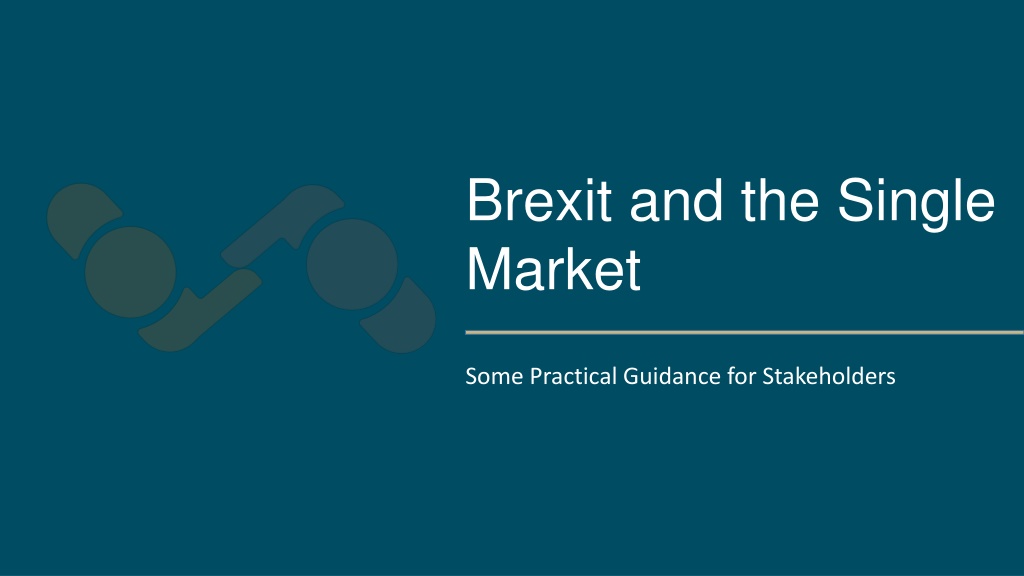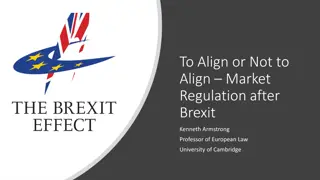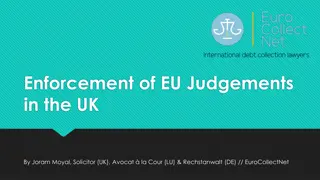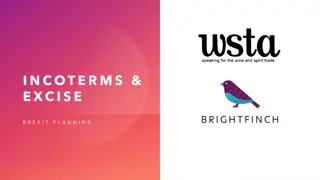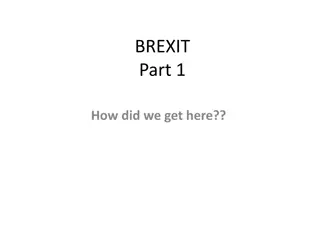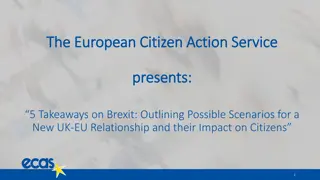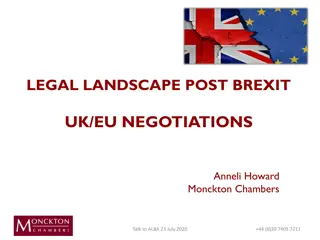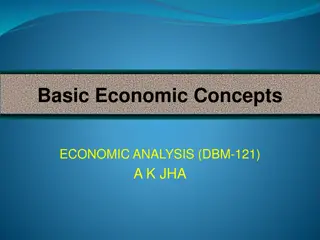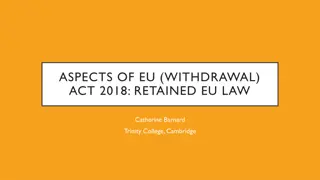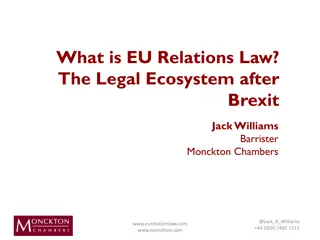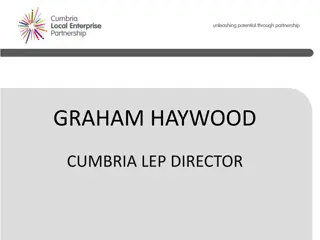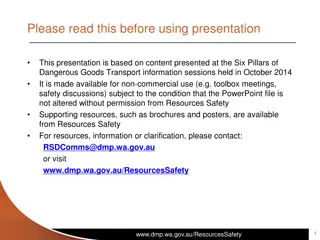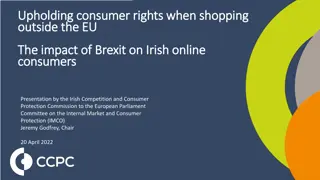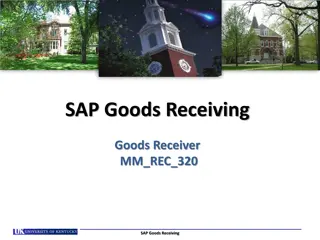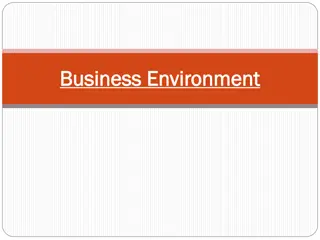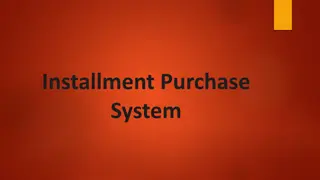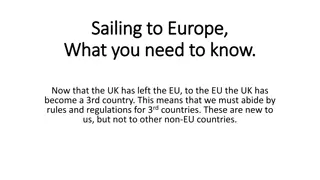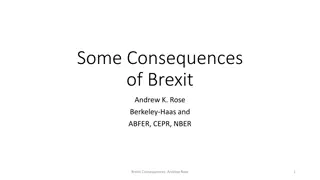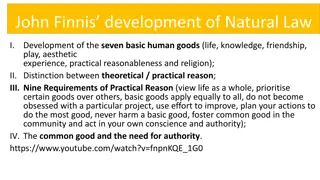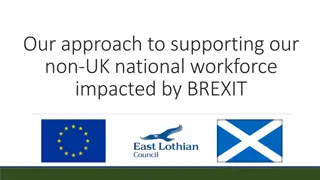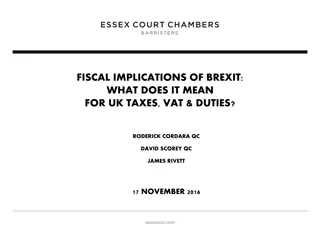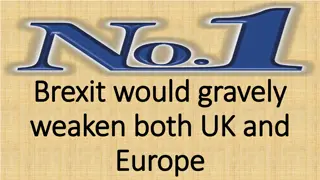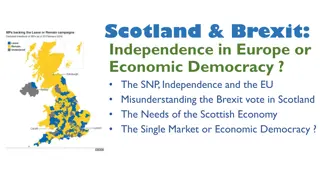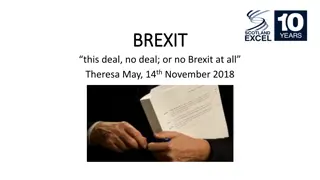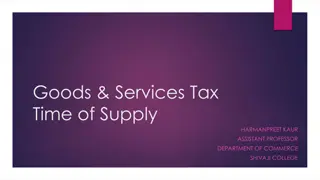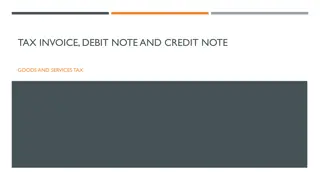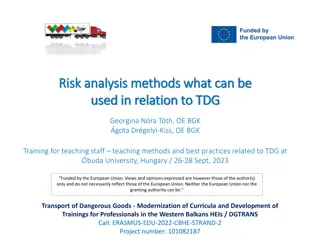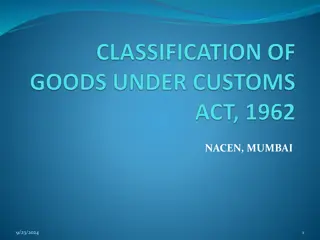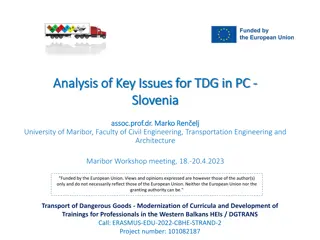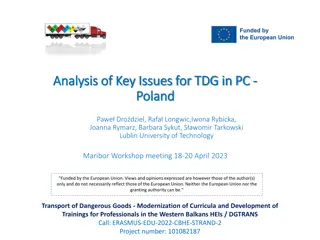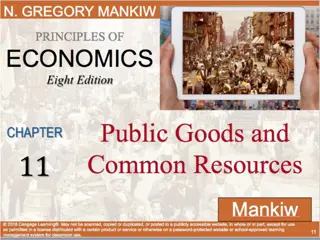Practical Guidance for Placing UK Goods on the EU Market Post-Brexit
Stakeholders involved in importing UK goods into the EU market post-Brexit need to understand the roles of importers and distributors, as well as their obligations under EU laws. This guidance explains the requirements, responsibilities, and transition period considerations for placing UK products on the market effectively.
Download Presentation

Please find below an Image/Link to download the presentation.
The content on the website is provided AS IS for your information and personal use only. It may not be sold, licensed, or shared on other websites without obtaining consent from the author. Download presentation by click this link. If you encounter any issues during the download, it is possible that the publisher has removed the file from their server.
E N D
Presentation Transcript
Brexit and the Single Market Some Practical Guidance for Stakeholders
Placing UK Goods on the Market (1) Distribution vs Importation Anyone who places a product from a third country on the EU market is considered an importer Anyone who is part of a supply chain, and that is not a manufacturer or an importer is considered a distributor. UK will be considered a third country come January. If you are importing from the UK directly for placing on the market come January, you will be considered an importer under EU law. Are you aware of the EU obligations pertaining to Importers?
Placing UK Goods on the Market (2) Obligations of Importers As an importer, you must be sure that the product you are placing on the market satisfies all requirements of the concerning EU laws Is the UK manufacturer abiding by the regulations and directives of the product in question? Does the product have all necessary labelling, documentation and approvals? Have examinations and approvals been performed by Union appointed bodies? If not, are they recognized by EU law? Remember, the placing on the market responsibilities of the manufacturer also fall on the importer.
Placing UK Goods on the Market (3) Placing Products During the Transition Period A product placed on the market from the UK before the end of December does not require any modifications (pertaining to Brexit) This applies in particular if: 1. You have purchased a product shipment from the UK before January, 2. You have received an order confirmation online for a UK shipment destined for Malta, 3. You are selling a shipment that you had received from the UK 4. You wish to start selling a UK product in Q1 2021, but have already purchased the product 5. You are expecting a shipment to arrive from a UK manufacturer after January If the above applies to you or your product, you must keep any documentation as evidence that the product was placed on the market during this time
Placing UK Goods on the Market (4) Was it Placed on the Market? In cases where: 1. You have pre-ordered goods from the UK that have not been manufactured yet 2. You have signed a contract for supply of fungible goods with a UK manufacturer 3. You will purchase goods from a UK manufacturer that have been produced already, but are not available for sale prior to January 4. You have accepted an offer for a product from a UK company, but have no information on manufacturing dates Those goods/products are not considered as placed on the market. By proxy, these exercises do not constitute placing on the market activities The concerned goods, once actually placed on the market, will have to follow EU regulations as though they were coming from a third country
Authorized Representatives A person established within the EU that has received written mandate from a manufacturer to act on his behalf. Authorized representatives established in the UK will no longer be recognized by EU laws. If a UK company you are importing from has not established an authorized representative, you yourself must first be appointed as an authorized representative before trade can continue (Where an authorized representative is required). Be sure to check if your UK manufacturer has established an authorized representative and get in touch!
The Fate of UK Notified Bodies A notified body is designated by a Member State to assess the conformity of products to be placed or already placed on the EU market. UK will no longer be a Member State in January 2021 As a consequence, UK designated notified bodies will not be recognized in the EU after December 2020 Have you transferred your files from UK notified bodies to EU ones? Has your UK notified body established itself in another Member State? Details of all recognized Notified Bodies are uploaded on the NANDO website. You can find their contact information there.
Changes in Labelling Some EU laws require printing of addresses of the manufacturer or an authorized representative on a label for compliance. When the UK stops being a Member State, labelling details need to change accordingly. In cases were labels must contain addresses of an operator established in the EU, UK addresses will no longer be recognized by the EU market. Does the labelling on your product require an update?
Additional Resources and Links MCCAA Guidance for Stakeholders Sector Specific Notifications NANDO Website Importers and Distributors Technical Regulations Division The EU/UK Withdrawal Agreement Email: rad@mccaa.org.mt
Thank You Christopher Abela Mizzi Regulatory Affairs Directorate t. (+356) 2395 2139 e. christopher.abela-mizzi@mccaa.org.mt
